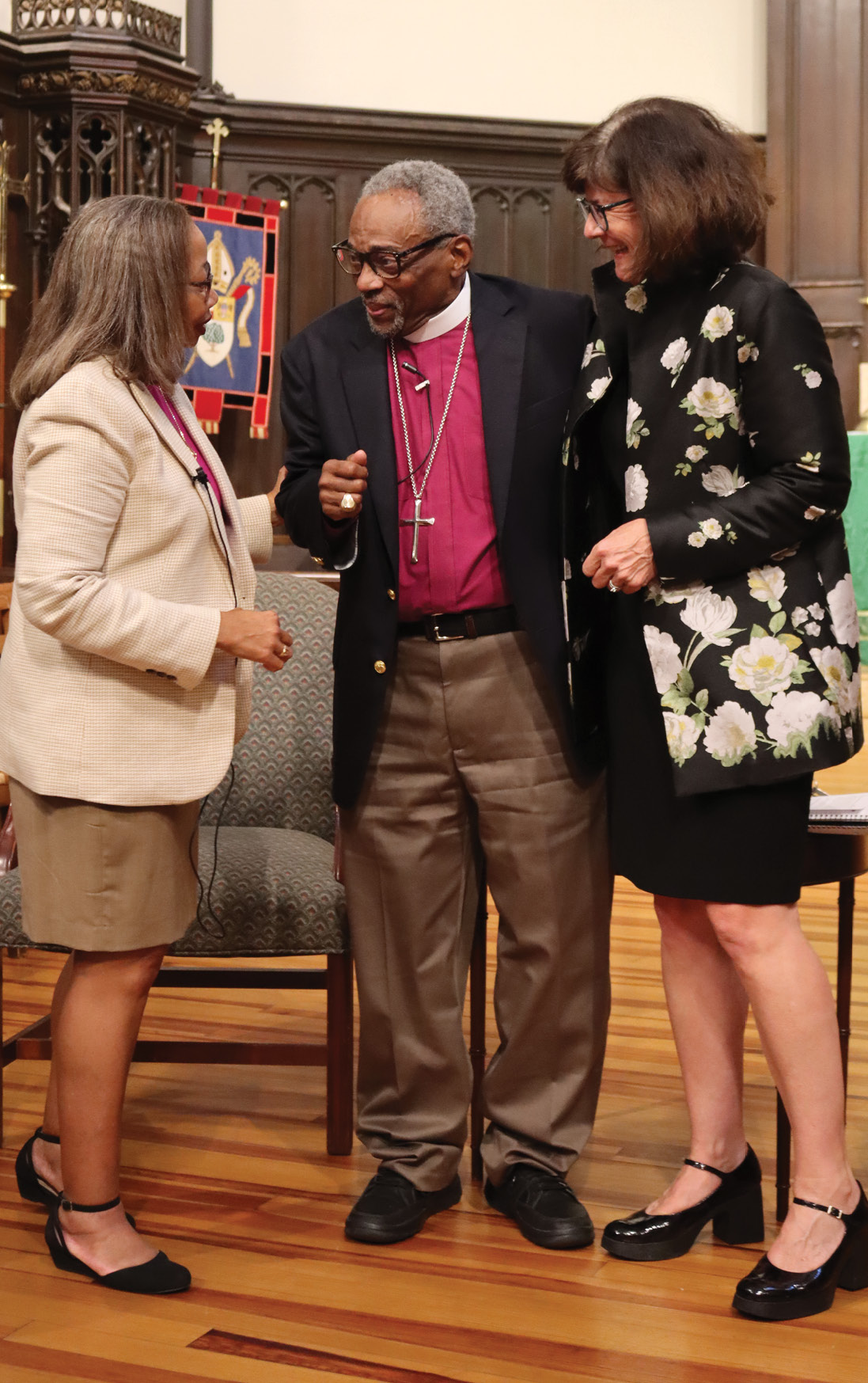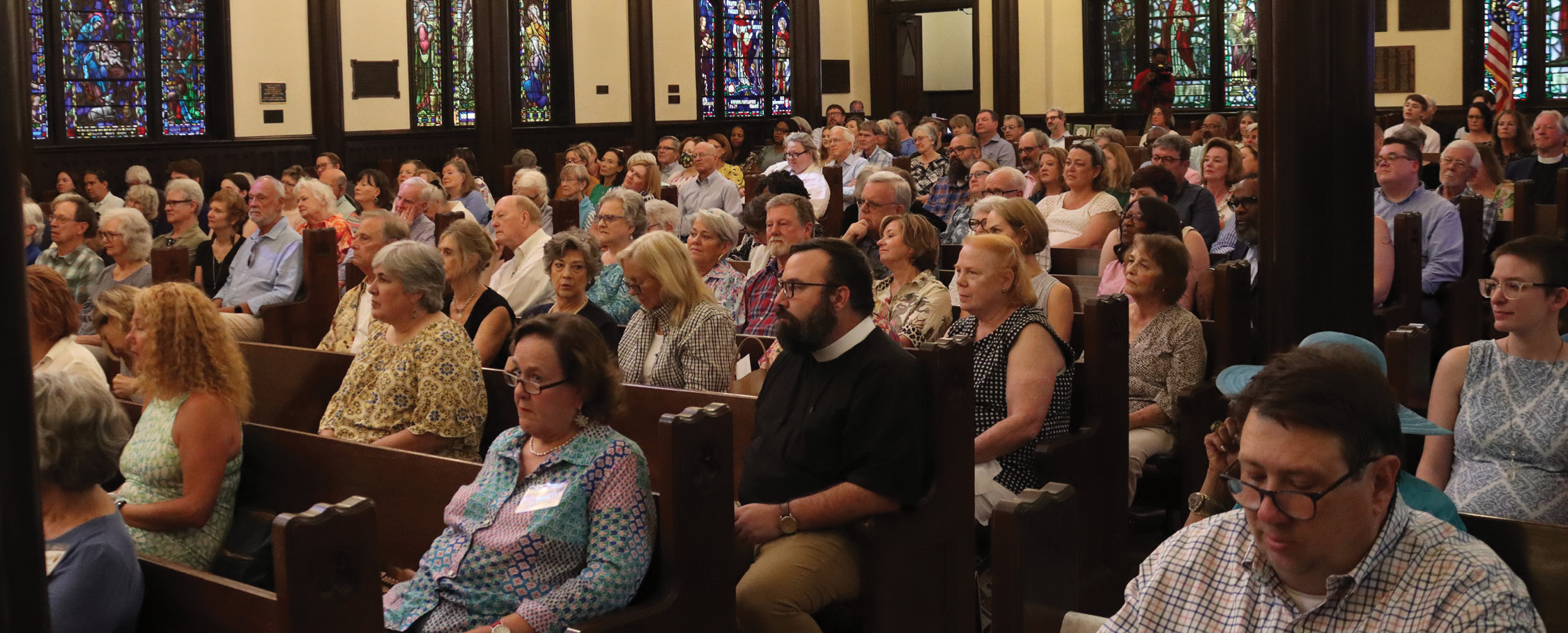The weekend of August 9th and 10th was a busy one at St. Andrew’s Cathedral. A backpack blessing brought young students to the altar with their back-to-school gear. A concert by Rev. CJ Meaders of St. Columb’s, Ridgeland filled the parish hall with joyful noise.
In the midst of it all was an attempt to reckon with a dark but important anniversary in Mississippi’s history—the August 28, 1955 murder of Emmett Till. That killing, which captured the attention of the nation 70 years ago and galvanized the Civil Rights Movement, was the inspiration for two events over the weekend.
On Saturday, Bishop Dorothy Wells presented a day-long workshop titled “The History of Us: White, Black and Together in the United States,” a program she developed during her years in the Diocese of West Tennessee. The next day, Bishop Wells was joined by former Presiding Bishop Michael Curry for “Yet With a Steady Beat,” in which the two bishops had a conversation on the legacy of Till’s murder in Mississippi and the United States.
Both events drew capacity crowds. On Sunday afternoon, the pews of the Cathedral were full and played host to many clergy and Episcopalians as well as visitors from a variety of faiths. Recently inaugurated Jackson mayor John Horhn sat in the front row.
Once the crowd was settled, Bishops Curry and Wells took their seats and, after a welcome from the Rev. Anne Maxwell, dean of the Cathedral, they recounted Till’s story.
Till, a Chicago boy who was visiting his great uncle in Money, Mississippi, went with his cousins to buy snacks from a store owned by Roy and Carolyn Bryant, who were white. Someone in the store said Till whistled at Carolyn Bryant while making his purchase, which prompted her husband and his half-brother to kidnap Till from his uncle’s home that night. They later beat and shot him and threw him into the Tallahatchie River, and his mutilated body was found three days later. The men were acquitted of the murder by an all-white, all-male jury.
Growing up in Buffalo, New York, as the child of parents raised in North Carolina and Alabama, Curry recalled seeing in Jet magazine the photo of Till in his open casket. Dissemination of the image was endorsed by his mother Mamie Till-Mobley, who said at the time, “Let the world see what I’ve seen.”
That image “shook people of decency and goodwill of all races,” Curry said, where reports of other lynchings across the South hadn’t. The image meant that memories of what happened to Till, whom Curry called a martyr, wouldn’t be forgotten.
“It was a defining moment, to a great extent, for the civil rights movement,” he added, making it not only an important moment for Mississippi but for the entire nation, and especially for America’s Black communities. When Rosa Parks helped initiate the anti-segregation bus boycott in Montgomery, Alabama, in December 1955, she thought of Till as she did so.

Wells said that when she visited the Emmett Till Interpretive Center in Sumner, Mississippi, in April 2024, she found it “gut-wrenching” to think of the fear and pain Till experienced after being abducted. “Everything his mother feared had come to pass,” she said.
Grappling with the mindset of Till’s attackers, Wells wondered, “How do we get to a point in our world where our sense of care for one another is just absent, that you could look at a 14-year-old boy and think, ‘We know we’re going to kill him’?”
After a pause, Curry mentioned the 1945 novel Invisible Man by the Harlem-based author Ralph Ellison, in which he wrote, “I am invisible, understand, simply because people refuse to see me.”
Calling it “one of the most significant books ever written,” he said its description of the dynamic of invisibility means “if someone is invisible, if they’re just a number or a collection, then what you might never do to an individual if you saw them as a person … all of a sudden the unthinkable becomes possible.”
This dynamic wasn’t just at work in the Jim Crow South, he added, but also in the forced removal of Native Americans from their lands in the United States and Nazi Germany’s massacre of Jews, gypsies, and LGBTQ+ persons.
“That’s how otherwise good, decent people, very often church-going or family people, can be complicit or look away or choose not to know and not to see,” Curry said.
While the subject matter was heavy and the reflection deep, the conversation between Curry and Wells was not without moments of levity. The former Presiding Bishop peppered his scholarly and passionate remarks with jokes and playful stories.
Ultimately, his message hinged on the idea that the church must strive to bring out the “better angels” of its people with an approach simultaneously pragmatic and idealistic, and pursue that path even when progress is set back, as it inevitably will be, by evil forces.
“Don’t give up and don’t quit,” he said. “Keep going to church. Keep going to church, synagogue, mosque, wherever. Go somewhere that gets you close to God, because we can’t do it by ourselves. We need God and Lord knows we need each other.”
